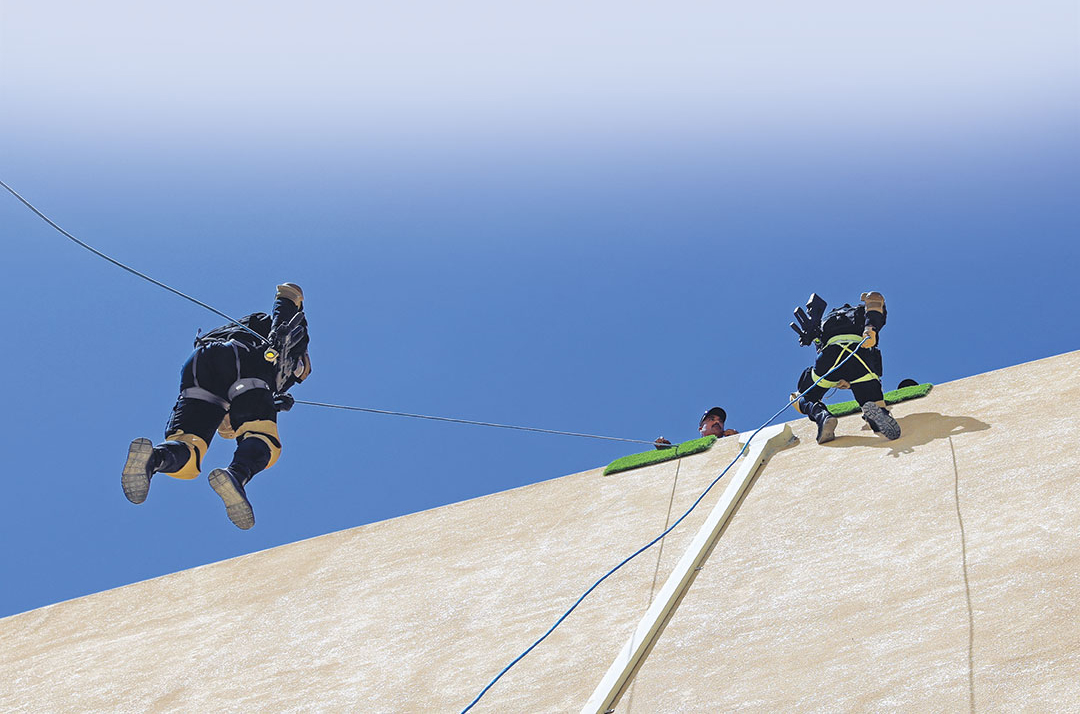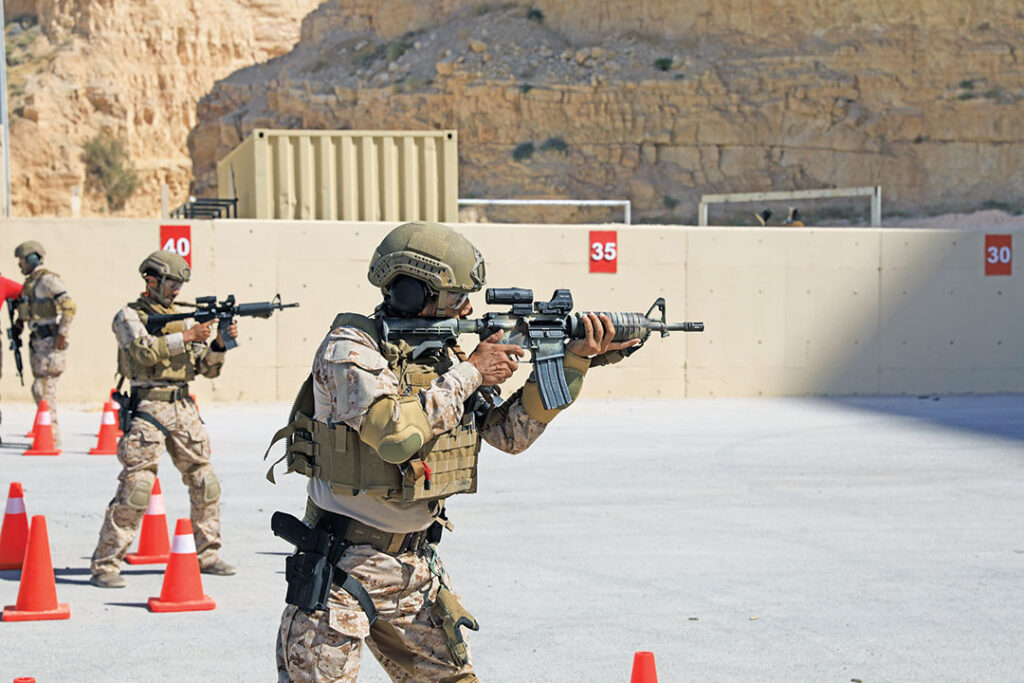The King Abdullah II Special Operations Training Center (KASOTC) in Jordan is the country’s best-equipped training area to ready special operations forces for the demands of modern conflict. With the increasing intensity of terrorist operations in most regions of the world, it has become necessary for countries to form agile and fast-moving forces. KASOTC helps fill that formational role. Unipath talked about KASOTC with its director, Brig. Gen. Nael Al Shqeirat of the Jordan Armed Forces.
Unipath: The King Abdullah II Special Operations Training Center plays a major role in building the capabilities and preparing special operations teams in the region. Could you describe the center’s training curricula and programs?
Brig. Gen. Al Shqeirat: The center implements several training programs and curricula covering five main axes:
- First axis: Special forces and counterterrorism
- Second axis: Internal security forces and VIP protection
- Third axis: Medical training
- Fourth axis: Leadership and team building
- Fifth axis: Training humanitarian organizations
- Each axis includes a number of specialized courses at different levels — basic, intermediate and advanced.
In addition, the center creates training courses to meet the customer’s specific requirements, called tailored training courses.
The center also works on enhancing the plans and programs of the King Abdullah II Royal Special Forces within the framework of strengthening alliances with special operations forces from brotherly and friendly countries. It also provides the appropriate capabilities to unify concepts among these forces by taking advantage of the facilities and capabilities at the center in a way that helps strengthen relations and common understanding between these forces to better confront common challenges in the future.

Unipath: How many courses are offered by KASOTC and how many participants arrive from friendly and brotherly countries?
Brig. Gen. Al Shqeirat: Between 2009 and 2024, the center provided training and training support services to 124,000 individuals from the special operations, counterterrorism and internal security forces of 73 countries, in addition to 17 governmental and nongovernmental organizations.
Unipath: How does the center develop training programs and the expertise of instructors?
Brig. Gen. Al Shqeirat: The center employs a specific methodology in this regard. Programs are subject to periodic review to ensure they meet new challenges and emerging threats, as well as to keep pace with the latest training programs in other parts of the world. This is done with the assistance of local, regional and international partners for the purpose of sharing expertise and enhancing joint cooperation.
Trainers undergo periodic and ongoing evaluations to maintain their capabilities. They are also encouraged to follow self-development programs by attending courses as well as institutional development initiatives at the center, where trainers participate in multiple refresher and qualification courses in cooperation with local, regional and international partners.
Unipath: Do you hire trainers and experts from friendly countries?
Brig. Gen. Al Shqeirat: The center is constantly working to strengthen its relations with a number of international partners from friendly countries. We currently have a partnership with the IPC company in the U.S., which specializes in training, simulation systems and moving targets. The center is also in the process of signing a cooperation agreement with another U.S. company specialized in training. This agreement encompasses foreign experts and trainers. The center can also bring in any foreign expert, per customer requirement, through the network of relationships and partnerships that we have with international companies.

Unipath: KASOTC is known for its annual Warrior Competition. How is this event developed and the judging teams selected?
Brig. Gen. Al Shqeirat: We hosted the 13th edition of the Warrior Competition in 2024. Every edition is distinctive and based on scenarios that simulate the real-life duties of elite units in various countries. Competitive events are created in partnership with training companies in the U.S. They apply to organize the event based on a request from the center’s management for financial offers to manage and design the competition’s events. The winning company is selected based on its experience in the field of training elite units and organizing international military competitions in a way that ensures transparency, impartiality and integrity of the competition. These are core values of the center, which is why the U.S. company Nexus was chosen to manage the 13th edition of the Warrior Competition.
Unipath: What new programs will the center offer in partnership with friendly countries?
Brig. Gen. Al Shqeirat: Several new plans and programs will be added to the training packages offered by the center, especially programs related to integrating modern technology into the training process with the aim of reducing the rate of losses among elite forces and increasing their chances of success in carrying out missions. This includes virtual reality technology and artificial intelligence. All of this will be done through permanent and continuous cooperation and coordination with local and international partners. These programs will be announced through the center’s website as soon as they are available.
Unipath: How does the center adapt its curriculum to include new developments in modern warfare?
Brig. Gen. Al Shqeirat: By virtue of its association with the Jordan Armed Forces as a major partner, the center is aware of all emerging threats and developments in the regional and global security environment, and the lessons learned from analyzing current military and security operations. These developments are studied and introduced into our training curriculum so that it reflects real-life situations. Moreover, and in cooperation with regional and international partners, the center has been able to continuously develop new training programs and update existing ones in a manner consistent with the reality in which we live.
Unipath: The training must include both field and theoretical training. Does theoretical training include combating cyberattacks?
Brig. Gen. Al Shqeirat: The training curricula adopted by the center encompass both theoretical and practical aspects, especially in the areas of tactical planning at the operational and tactical levels, as well as steps in the decision-making process, and multiple analysis and studies of the forms of threats and the ability to reach the optimum decision. Regarding cybersecurity training, this is done through local, specialized partners who have a full understanding of training on this subject. The center ensures that all the necessary requirements for the success of this type of training are provided in full coordination and cooperation with the local partner.
Unipath: How does training incorporate the need for forces to interact during operations with other branches of the military?
Brig. Gen. Al Shqeirat: The main axes of training at the center target special operations forces, counterterrorism forces and internal security forces, primarily to ensure that these forces possess all the skills and knowledge needed to enable them to conduct missions successfully. One aspect of this is the ability of these forces to work in a joint operations environment, especially with the Air Force. The center has access to various resources in the Air Force for the purposes of training with elite forces if this is a client requirement. By virtue of its partnership with the Armed Forces, the center can also secure the necessary requirements for any joint operations training program requested by a client, including trainers from different branches of the Armed Forces.
Unipath: What are the advantages of training in a multiterrain environment like Jordan’s?
Brig. Gen. Al Shqeirat: There is no doubt that training in Jordan’s varied environments and terrains, all of which are in close proximity to each other, saves a lot of time, effort and cost. It also provides the opportunity for armies to simulate the realities of operations by placing Soldiers in conditions that are as near as possible to the real-life and missions that they may be tasked with, taking into consideration the wide range of theaters of operations in which many armies in the world operate. By virtue of its partnership with the Armed Forces, the center can implement its training programs in environments with different terrains, like deserts, mountains and forests, as well as the marine environment, through free access to all fields and training areas affiliated with these forces.

